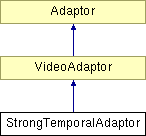StrongTemporalAdaptor Class Reference
drops all bypassing B- and P-frames <short description=""> More...
#include <StrongTemporalAdaptor.hpp>
Inheritance diagram for StrongTemporalAdaptor:

Public Member Functions | |
| StrongTemporalAdaptor (VideoESInfo *esi) | |
| Adaptor * | clone () |
| Create a shallow copy of the Adaptor. | |
| list< Frame * > | adapt (Frame *frm) |
| Accepts as input a frame, and checks if it can adapt the frame, If the frame is modified, a new Frame object is created and inserted into the return list. | |
| void | initialize () |
| Initialize internal data structures. | |
| list< Frame * > | close () |
| Close and destroy an Adaptor. | |
| u32 | getTranscodingCosts () const |
| returns adaptation costs (CPU only) | |
Protected Member Functions | |
| bool | doAdapt (Frame *&frm) |
| drops B and P frames | |
Protected Attributes | |
| u32 | inFrames |
| u32 | outFrames |
| u32 | lastDTS |
| u32 | origVopTimeIncr |
Detailed Description
drops all bypassing B- and P-frames <short description="">
- Author:
- Michael Kropfberger and Peter Schojer
- Version:
- Id
- StrongTemporalAdaptor.hpp,v 1.8 2005/01/19 13:41:41 mkropfbe Exp
Definition at line 64 of file StrongTemporalAdaptor.hpp.
Member Function Documentation
|
|
Accepts as input a frame, and checks if it can adapt the frame, If the frame is modified, a new Frame object is created and inserted into the return list. This new frame is returned only, if the size of the payload is larger than zero. If the frame was not modified, it is also inserted into the list. For more complex adaptors, it will happen, that the adaptor caches up one complete GOP and returns the full GOP in network order. A caching adaptor has to create deep-copies for each frames. Never directly modify the payload of the input frm, always create copies!!!
Reimplemented from Adaptor. Definition at line 90 of file StrongTemporalAdaptor.hpp. References doAdapt(), and initialize().
|
|
|
Create a shallow copy of the Adaptor. Creates an Adaptor with the same setup (without copying the current status).
Implements Adaptor. Definition at line 86 of file StrongTemporalAdaptor.hpp.
|
|
|
Close and destroy an Adaptor. Releases all internally buffered frame objects, and deallocate all allocated memory. The Adaptor must not be used after calling the close method!!!
Reimplemented from Adaptor. Definition at line 119 of file StrongTemporalAdaptor.hpp.
|
|
|
Initialize internal data structures.
Implements Adaptor. Definition at line 105 of file StrongTemporalAdaptor.hpp. Referenced by adapt().
|
The documentation for this class was generated from the following file:
